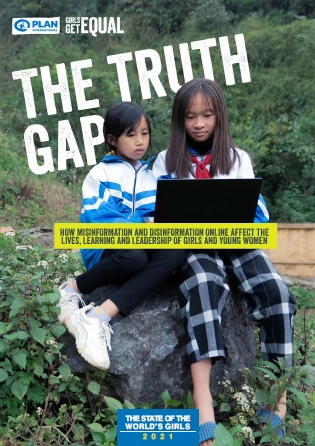Publication - 4 October 2021
The Truth Gap
Girls and young women spend huge amounts of time online. Access to the internet, where the gender gap remains very much an issue, is crucial in today’s digital world. So, too, are the navigation skills to make the most of all the internet has to offer.
This research clearly illustrates the benefits of the online sources and social media platforms which girls and young women use: they can connect to like-minded people all over the world, find information about topics taboo in their homes and communities and gain support for their activism. There is a downside to this.
They are also exposed to a whole world of false information, misogyny and stereotyping. It can mean wading through half-truths, prejudice and downright lies, to unearth the undoubtedly useful and truthful factual information and interesting opinions.
False information affects everyone, but there are specific consequences for girls and young women. Gender inequality effects every aspect of their lives and false information online further silences them, limiting their ambition and their ability to learn about the issues that interest them.
Misinformation and disinformation online is a human rights issue: affecting girls’ rights to participation, to education and to freedom of expression. As girls and young women struggle to disentangle truth from fiction, facts from propaganda, their trust in all sources of information — governments, academics, journalists, community leaders — is undermined.
We all need to be aware of this, to understand the specific effects of online misinformation and disinformation on girls and young women so we can tailor solutions to meet their needs.

